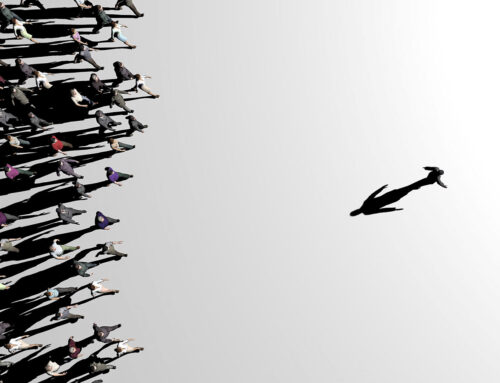Why Most People Do What They Can’t Imagine Doing
To what degree is your life governed by the wants, needs, expectations and demands of others? How likely is a situation, circumstance, or another individual likely to influence your behavior?
Near the end of what would be his final courtroom appearance, Russian dissident Aleksei Navalny chastised the judge and security personnel for their blind allegiance to a clearly corrupt and evil regime. “You have one, God-given life, and this is what you choose to spend it on?”The rest, of course, is history. Not long after that hearing, Navalny would die in one of Russia’s notorious gulags.
Which leaves us to wonder what might the judge and others responsible for Navalny’s incarceration have thought about their role in his death? Would they feel guilty? Indifferent? Resigned?
“When you think of the long and gloomy history of man, you will find more hideous crimes have been committed in the name of obedience than have ever been committed in the name of rebellion.” – C.P. Snow
Across history untold millions of men, women, and children have been unfairly imprisoned, starved, tortured, and murdered. Millions more were directly or indirectly responsible for these atrocities, often perpetrated against former neighbors, friends, and even family members.
Most of us reassure ourselves that we’re different, that we could never, ever engage in such cruelties. Yet the evidence – and scientific research – not only says we’re wrong, but that any of us are fully capable of being a death camp guard, or worse.
Following Whose Orders?
During the Nuremberg trials, the surviving architects of the Holocaust blamed Hitler and his inner circle for the genocide. Their defense? “I was following orders.”
So commonplace was this line that it gave rise to the idea that the German people suffered from some kind of ingrained disposition for blindly following their leaders, no matter how depraved their orders.
To test this hypothesis, in 1963 Yale psychologist Stanley Milgram ran a now-infamous study that not only eliminated this notion of German exceptionalism but also concluded that pretty much any human on the planet was capable of inflicting pain and suffering on others if ordered to do so.
Self-aware people are simply too confident and comfortable in who they are to sacrifice that identity at the alter of obedience to the outside world.
Over the ensuing years other studies followed suit. Their findings? As a species, humans can be truly terrible to each other simply because those in authority asked us to.
Attempts to explain this behavior include suggestions that following orders creates a kind of cognitive buffer that enables say, a death camp guard, from feeling responsible for his actions. He (or she) was merely acting as a cog in the wheel.
Building An Internal Compass
So how do we avoid becoming a monster at someone else’s direction?
If you follow modern psychological thought, you’ll find gobs of information linking obedience to types of power and authority, personality traits, qualities of leadership, and so on. While we don’t necessarily have an issue with any of these, we do think that, at some point, we need to look inward rather than out.
Specifically, we’d argue that the reason the majority of test subjects in Milgram-style studies perform poorly is because a majority of people test poorly on rates of self-awareness. Or put another way, self-aware people are far more likely to ignore or reject orders that don’t jibe with their internal compass.
They’re simply too confident and comfortable in who they are to sacrifice that identity at the alter of obedience to the outside world.
Why Most People Do What They Can’t Imagine Doing
To what degree is your life governed by the wants, needs, expectations and demands of others? How likely is a situation, circumstance, or another individual likely to influence your behavior?
Near the end of what would be his final courtroom appearance, Russian dissident Aleksei Navalny chastised the judge and security personnel for their blind allegiance to a clearly corrupt and evil regime. “You have one, God-given life, and this is what you choose to spend it on?”The rest, of course, is history. Not long after that hearing, Navalny would die in one of Russia’s notorious gulags.
Which leaves us to wonder what might the judge and others responsible for Navalny’s incarceration have thought about their role in his death? Would they feel guilty? Indifferent? Resigned?
“When you think of the long and gloomy history of man, you will find more hideous crimes have been committed in the name of obedience than have ever been committed in the name of rebellion.” – C.P. Snow
Across history untold millions of men, women, and children have been unfairly imprisoned, starved, tortured, and murdered. Millions more were directly or indirectly responsible for these atrocities, often perpetrated against former neighbors, friends, and even family members.
Most of us reassure ourselves that we’re different, that we could never, ever engage in such cruelties. Yet the evidence – and scientific research – not only says we’re wrong, but that any of us are fully capable of being a death camp guard, or worse.
Following Whose Orders?
During the Nuremberg trials, the surviving architects of the Holocaust blamed Hitler and his inner circle for the genocide. Their defense? “I was following orders.”
So commonplace was this line that it gave rise to the idea that the German people suffered from some kind of ingrained disposition for blindly following their leaders, no matter how depraved their orders.
To test this hypothesis, in 1963 Yale psychologist Stanley Milgram ran a now-infamous study that not only eliminated this notion of German exceptionalism but also concluded that pretty much any human on the planet was capable of inflicting pain and suffering on others if ordered to do so.
Self-aware people are simply too confident and comfortable in who they are to sacrifice that identity at the alter of obedience to the outside world.
Over the ensuing years other studies followed suit. Their findings? As a species, humans can be truly terrible to each other simply because those in authority asked us to.
Attempts to explain this behavior include suggestions that following orders creates a kind of cognitive buffer that enables say, a death camp guard, from feeling responsible for his actions. He (or she) was merely acting as a cog in the wheel.
Building An Internal Compass
So how do we avoid becoming a monster at someone else’s direction?
If you follow modern psychological thought, you’ll find gobs of information linking obedience to types of power and authority, personality traits, qualities of leadership, and so on. While we don’t necessarily have an issue with any of these, we do think that, at some point, we need to look inward rather than out.
Specifically, we’d argue that the reason the majority of test subjects in Milgram-style studies perform poorly is because a majority of people test poorly on rates of self-awareness. Or put another way, self-aware people are far more likely to ignore or reject orders that don’t jibe with their internal compass.
They’re simply too confident and comfortable in who they are to sacrifice that identity at the alter of obedience to the outside world.



